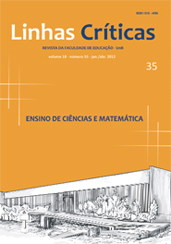Virtual Field Trips: learning beyond the Classroom Walls
DOI:
https://doi.org/10.26512/lc.v18i35.3838Keywords:
Virtual Field Trip, Reading, WritingAbstract
This paper provides an overview of a holistic approach to engaging students in the readingand writing processes while engaged with a science topic. Recent advances in technologyand internet access have opened up a multitude of resources never before available toteachers and students. Many of these, including Virtual Field Trips can be used to stimulateinterest and motivate students to select their own topics of interest and self direct their ownresearch, reading, and learning (Scott, 2007). This paper presents the exploration and useof Virtual Field Trips as a means of engaging students in researching, writing, and sharingwith others their developing knowledge on the lifecycle of an eagle. The nesting site of theeagles in Decorah, Iowa provides the location for the Virtual Field Trip being reported on.
Downloads
References
AKERSON, Valarie; YOUNG, Terrell. Science the “write” way. Science & Children. Arlington VA, v. 43,n. 3, p. 38-41, nov./dez. 2005.
BOGDAN, Robert; BIKLEN, Sari. Qualitative research for education: An introduction to theories andmethods (4aEd.). Toronto: Allyn and Bacon, 2003.
CRESWELL, John. Qualitative inquiry and research design: Choosing among five traditions. ThousandOaks: Sage Publications, 1998.
EMPSON, Rip. Nearing 100 million views, decorah eagles become the most watched live stream ever.(n.d.). Disponível em <http://techcrunch.com/2011/05/12/nearing-100-million-views-decorah-eagles-become-the-most-watched-live-stream-ever/>. Acesso em: 15 setembro de 2011.
FELDMAN, Dara. Technology and early literacy: A recipe for success. 2002. Disponível em. Acesso em: 15 setembrode 2011.
FULTON, Kathleen. Learning in a digital age: Insights into the issues. Technological Horizons InEducation. Irvine, n. 25, p.14-41, 1998.
GUTHRIE, Larry F.; RICHARDSON, Susan. Language arts: Computer literacy in the primary grades.Educational Leadership. Alexandria, v. 53, n. 2, p. 14-17, 1995.
GARDNER, Howard. Multiple intelligences: New horizons. New York: Basic Books, 2006.
HODSON, Derek. Science curriculum development: Lessons from the past. In: DEREK. Hodson;BENCZE, John Lawrence; PEDRETTI, Erminia; NYHOF-YOUNG, Joyce (Eds.) Changing scienceeducation through action research: Some experiences from the field. Toronto: Imperial Oil Centre forStudies in Science, Mathematics and Technology Education; Ontario Institute for Studies in Education,University of Toronto, 2001, p. 25-43.
KILBOURN, Brent. For the love of teaching. London: The Althouse Press, 2000.
KLEMM, Barbara; TUTHILL, Gail. Virtual field trips: Best practices. International Journal of InstructionalMedia. Tolland, v. 30, n. 2, p. 177-193, 2002.
LINCOLN, Yvonna; GUBA, Egon. Paradigmatic Controversies, Contradictions, and Emerging Confluences.In: DENZIN, Norman; LINCOLN, Yvonna (Eds.). Handbook of Qualitative Research. Thousand Oaks:Sage, 2000, p.163-188.
MERTLER, Craig. Action research: Teachers as researchers in the classroom. Thousand Oaks: SagePublications, 2006.
ONTARIO MINISTRY OF EDUCATION AND TRAINING. The Ontario curriculum, Grades 1-8: socialstudies. Toronto, On: Queen’s Printer for Ontario, 1998.
PARR, Michann; CAMPBELL, Terry. Teaching the language arts. Mississauga, On: John Wiley & Sons,Ltd, 2012.
PEDRETTI, Erminia. Facilitating action research in science, technology and society (STS) education:an experience in reflective practice. Educational Action Research. Routledge, v. 9, n. 3, p. 307-327,1996.
PEDRETTI, Erminia. Action research in science-technology-society education: The road less traveled(Unpublished doctoral thesis). Ontario Institute for Studies in Education, University of Toronto, Toronto,Canada, 1994.
RISINGER, C. Frederick. Using online field trips and tours in social studies. Social Education, 74(3),2010. 137-138.
SCOTT, Jeff. Exploring the use of virtual field trips with elementary school teachers:A collaborativeaction research approach (Unpublished doctoral thesis). Ontario Institute for Studies in Education,University of Toronto, Toronto, Canada, 2007.
STAKE, Robert. E. Case Studies. In: DENZIN, Norman; LINCOLN, Yvonna. (Eds.), Handbook ofqualitative research(2ndEd). London: Sage Publishing, 2005, p. 236-247.
STANDEN, Andrew. Grounded. Edutopia, October, 2005, p. 34-39.
STRICKLAND, Dorothy S.; GANSKE, Kathy; MONROE, Joanne K. Supporting struggling readers andwriters: Strategies for classroom intervention. Portland: Stenhouse Publishing, 2006.
UNDERWOOD, Jean. A comparison of two types or computer support for reading development. Journalof Research in Reading. Coventry, v. 23, n. 2, p.136-148, 2000.
VETO, Dori. Motivating reluctant adolescent readers. The School Administrator. Alexandria, v. 63, n.4, p. 31-34, 2006.
ZANETIS, Jan. The beginner’s guide to interactive virtual field trips. Learning & Leading with Technology.Eugene, v. 37, n. 6, p. 20-24, 2010.
Downloads
Published
How to Cite
Issue
Section
License
Copyright (c) 2016 Linhas Críticas

This work is licensed under a Creative Commons Attribution 4.0 International License.
Authors who publish in this journal agree to the following terms:
-Authors maintains the copyright and grants the journal the right of first publication, the work being simultaneously licensed under the Creative Commons Attribution License which allows the sharing of the work with recognition of the authorship of the work and initial publication in this journal.
- Authors are authorized to enter into additional contracts separately, for non-exclusive distribution of the version of the work published in this journal (eg publish in institutional repository or as a book chapter), with acknowledgment of authorship and initial publication in this journal.
-Authorers are allowed and encouraged to publish and distribute their work online (eg in institutional repositories or on their personal page) at any point before or during the editorial process, as this can generate productive changes as well as increase the impact and the citation of published work (See The Effect of Free Access).



